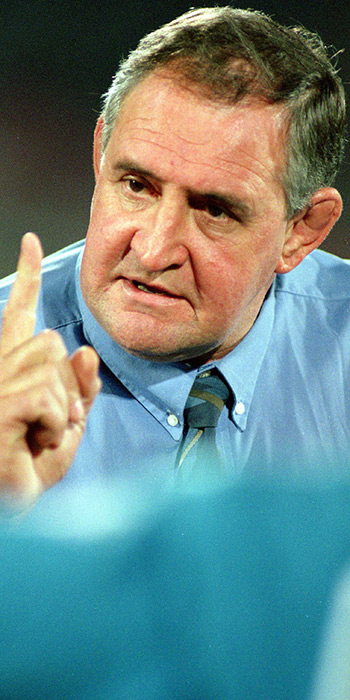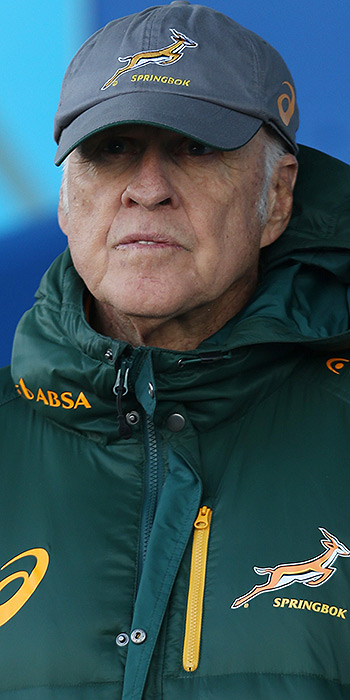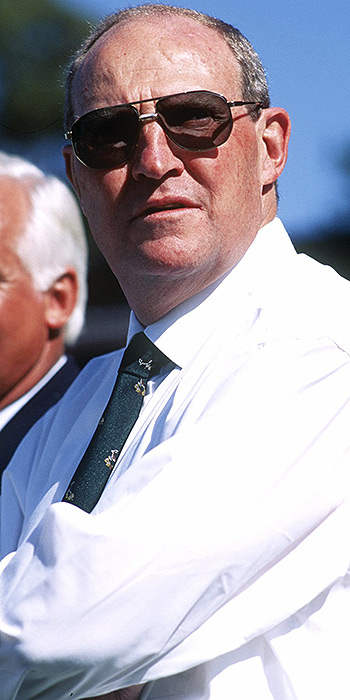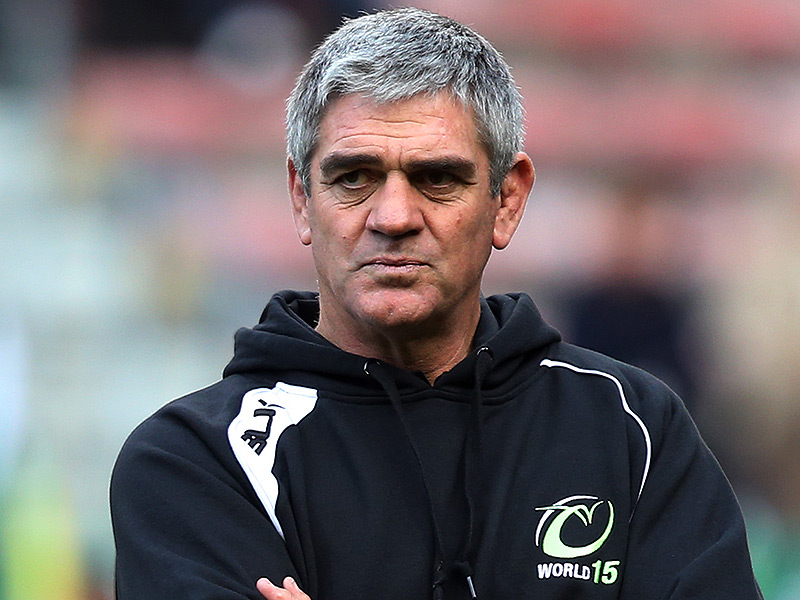SA's biggest disease: #TheCoachMustFall
Let us just, for one moment, pretend South Africa is not a country where crime and corruption are rife, where people are highjacked, raped and killed every waking hour. Let us, in that same moment, pretend that rugby is the most important aspect in the lives of all 53 million people in the country.
 Then, perhaps, the incandescent and perfervid outbursts over South Africa's third-place finish in the World Cup can be understood.
Then, perhaps, the incandescent and perfervid outbursts over South Africa's third-place finish in the World Cup can be understood.
The latest lynch mob calling for the head of Springbok coach Heyneke Meyer is headed by none other than former Springbok captains Wynand Claassen and Divan Serfontein.
In their maudlin letter, addressed to other former players, they quote a couple of journalists to give credence to their reasoning – including a female that said she "lost her crush" on the Boks.
Now I am not saying this reporter does not know enough about the game, far from it. It is that kind of emotional reasoning that makes the current situation and the entire letter so laughable.
But that is not new to South Africa.
We are ruled by emotion – when it comes to this game played with an oval-shaped ball – with sound reasoning quickly flying out the window.
Springbok coaches have often come and gone in alarmingly quick fashion.
In the pre-isolation amateur era – when Tests were not the staple diet it is today – coaches were rotated regularly.
The most successful Bok coaches in the pre-isolation era were Danie Craven (1949 to 1956) and Cecil Moss (1982 to 1989).
However, in the post-isolation era (1992 onwards) coaches have more often than not been discarded like yesterday's dirty laundry.
There has not even been a hint of continuity, the one aspect that has set New Zealand apart from the rest in the last 12 years.
It started with John Williams in 1992, who won just one of the five Bok Tests he was in charge of and was summarily dismissed with a 20 percent success rate. It mattered not that his rag-tag team, with provincialism rife, was put up against the three top – and most professional – outfits in the world in Australia, New Zealand and England. And that after a decade in isolation.
Ian McIntosh took over in 1993 and after the disastrous tour of New Zealand in 1994, he was given the DCM (don't come Monday) with four wins in 12 Tests – a 33 percent success rate.
Kitch Christie took over from McIntosh and is still the only coach with the distinction of a 100 percent success rate. His 14 Tests included the 1995 World Cup victory. A combination of his deteriorating health (cancer) and a fall-out with the powers that be saw him being asked to 'step down' while in hospital.
Andre Markgraaff coached the team in 1996, winning eight of his 13 Tests (61 percent success rate), before an ill-judged statement on blacks saw him given his marching orders.
Carel du Plessis started 1997 – losing the series to the British and Irish Lions, winning just the final Test, as well as losing three of the Tri-Nations Tests. Despite a 61-22 demolition of Australia in the last match of the Tri-Nations, his romanticism became too much for his bosses and he was axed, with a 37 percent success rate.
Nick Mallett took over for the year-end tour of 1997 and would go on to achieve a 71 percent success rate, including 16 successive Test victories and a Tri-Nations title. His tenure will be forever clouded by his ill-timed decision to axe captain Gary Teichmann and take Bobby Skinstad to the 1999 World Cup in his place. He was eventually axed – reportedly over a comment he made to a journalist over ticket prices, although insiders say he had fallen foul of the boardroom bullies long before that. His success rate mattered not.
Another romantic, Harry Viljoen, took over from Mallett in 2000 and would depart the scene with a 53 percent success rate. He walked away before he was axed, but clearly saw the writing on the wall. His tenure was marked by weird tactics that included not kicking the ball once in 70 minutes of a match – the players running the ball out from their own in-goal area.
Rudolph Straeuli took over from Viljoen and his era (a 52 percent success rate) and will always be remembered for Kamp Staaldraad and the disastrous 2003 World Cup campaign – a quarterfinal exit.
Jake White took South Africa to World Cup glory in 2007, finishing with a 67 percent success rate, before being shown the door – despite having rebuilt the team and taking them to No.1 on the world rankings. He also fell foul of the boardroom bullies, despite his success.
Peter de Villiers followed in 2008 and would eventually get the boot after the Boks' quarterfinal exit at the 2011 World Cup – a 62 percent success rate, which include a series win against the B&I Lions in 2009 and a Tri-Nations series win the same year. He will be forever be know as the first 'quota coach' – branded so by South African Rugby Union President Oregan Hoskins.
Heyneke Meyer, the current coach (about to be sacked or reinstated for another four years?) has a 67 percent success rate. His failures against the All Blacks is what is at the heart of the lynch mobs chasing him.
This chopping-and-changing is in stark contrast to how New Zealand have treated their coaches in recent decades.
They have used just six coaches in the same period – Laurie Mains (1992–95, 34 Tests, 23 wins and 69.1 percent success rate – World Cup Final loss), John Hart (1996–99, 41 Tests 31 wins, 76.8 percent success rate – World Cup semifinal exit), Wayne Smith (2000–01, 17 Tests, 12 wins, 70.6 percent success rate), John Mitchell (2002–03, 28 Tests, 23 wins, 83.9 percent success rate – World Cup semifinal exit in 2003), Graham Henry (2004–11, 103 Tests, 88 wins, 85.4 percent success rate, World Cup quarterfinal exit in 2004 and winner of the 2011 World Cup), Steve Hansen (2012–present, 54 Tests, 49 wins, 90.7 percent success rate and winner of the 2015 World Cup).
The significant change came after 2003, when New Zealand opted for 'long-term planning', instead of the more regular 'changes' to their coaching staff.
Henry, with the experience of having been Wales head coach, took over and already started grooming his successor – Hansen. It is worth noting that despite the 2007 World Cup disaster (quarterfinal exit and some strange selections) and a whitewash at the hands of the Boks in 2009, Henry was retained and repaid the faith on home soil in 2011.
It was also during this period, post-2007, that New Zealand started dominating the game and world rankings.
In the period preceding Henry – when they used four coaches in 15 years – the All Blacks' rankings fluctuated wildly – from sixth in 1994, to first in 1996/97, back down to fifth in 2001, up to first in 2001 and back down to third in 2003. Since 2004 they have been no lower than third and have been No.1 for the past four years – steadily putting daylight between them and the rest, from 89.61 rankings points to just under 94 rankings points at present.
Since 2004 – the Henry/Hansen era – South Africa held the No.1 spot just briefly in 2007 (World Cup winners under White) and 2009 (B&I Lions winners & Tri-Nations champions under De Villiers).
Under Meyer, the rankings points rose from 84.34 (January 2012) to 89.34 (December last year), dropping down to 88.23 this year.
Perhaps, just perhaps, the New Zealand model of the past decade-and-a-half (standing by the coach in dark times – Henry, 2007 and 2009) is better than South Africa's favourite pastime of #TheCoachMustFall.
We can debate game plans and suggest Meyer is an 'autocrat' – as the former Boks, Claassen and Serfontein, suggested. We can look at just one win from eight encounters with the All Blacks and say Meyer is a failure.
However, New Zealand stood by Henry – despite a World Cup quarterfinal exit in 2007 and being whitewashed by the Boks in 2009. They stood by their coach during those dark times.
Jake White was axed after a successful World Cup campaign, Pieter de Villiers was openly called a 'quota appointment' by his employers and later discarded (despite his 2009 successes).
Maybe it is time for #TheCoachMustStay.
But then again, this is South Africa – we are ruled by emotion, NOT logic.
As Claassen and Serfontein so aptly stated it, they want "instant" success.
Surely long-term domination is a better option?
Jan de Koning
@King365ed
@rugby365com






































